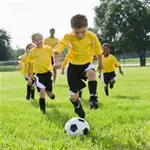"Our teenage son's football experience has soured because of coaches who do not want their players to have any fun. During one practice, his coach told him to get in line for a drill and he explained that his shoulder and arm hurt too much. The coach told him to quit whining over aches and get in line. When my son refused, from that day on, their relationship has been bad. Eventually, we took our son to a doctor and he missed the rest of the season." -- Anonymous Sports Parent
How Bullying Coaches Affect Your Child's Experience
Youth coaches are critical to kids' sports experiences. They can influence whether or not young athletes enjoy sports and want to continue to play. Some coaches get kids fired up and motivated, while others may discourage kids or take the fun out of sports altogether.
Bullied kids can think there is something wrong with them. This deflates them and leads to a lack of comfort and security in sports. Often, young athletes' first reaction to being treated this way is to feel shame. They feel as if they somehow caused the coaches to treat them badly, and they don't want to talk about their experience.
What's more, bullying can hurt an athlete's confidence–in and out of sports. Sometimes kids say they can't get a bully's negative words out of their heads. This leads to difficulty focusing on what they should focus on. They sometimes obsess about what a coach might say or do if they make a mistake. The kids are fearful, and preoccupied with gaining approval from the coach (or not disappointing them). Often, they are afraid of how the coach will react if they make a bad move or decision.
Behaviors of Bully Coaches
Bully coaches often tease, humiliate and intimidate kids. Parents should never underestimate the impact of this type of behavior.
As sports parents it's your job to ensure your athletes are in good hands. Bully coaches do not toughen up your young athletes, as they might insist, and they don't improve kids' performance, either. Coaches who bully--either with harsh words or physical harm–can hurt young athletes' self-esteem, undermine their social skills and make it hard for them to trust. In some cases, these coaches can make kids feel anxious and depressed.
What's more, coaches who use such negative feedback are generally focused too much on winning or turning out elite athletes. They give kids the message that winning is everything, and when kids focus too much on outcomes, it can prevent them from reaping the social and emotional benefits of taking part in sports.
Focusing too much on the score or on winning also can hurt kids' performance. They often develop fear of failure. They stop taking risks and they play too tentatively because they're afraid of the coach's reaction.
- 2
- of
- 3









Discuss This Article